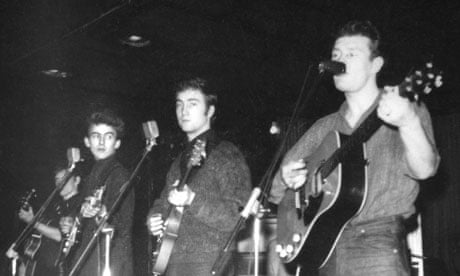It is generally recognised that the Beatles developed their frenetic stage act during lengthy engagements in the clubs of Hamburg's Reeperbahn district. Less well-known is the fact that a Hamburg-based English musician, Tony Sheridan, was something of a role model in this process, with Paul McCartney referring to him as "The Teacher". While in Germany, the Beatles made their first recording, as a backing group for Sheridan, who has died aged 72 after undergoing heart surgery.
He was born Anthony Esmond Sheridan McGinnity in Norwich, into a middle-class Irish family. At school he had a conventional classical music education, learning the violin, singing in the choir and performing in Gilbert and Sullivan. Everything changed in 1956 when, like many British youths, he heard Lonnie Donegan's skiffle record Rock Island Line. Sheridan took up the guitar and formed a skiffle group, the Saints, with school friends. After winning a local talent contest, they decided to try their luck at the famous Soho coffee bar the 2i's.
Most of the group soon returned home, but Sheridan decided to stay in London and look for work. He played regularly at the 2i's, acquired an electric guitar and in 1958 became a regular performer on the television show Oh Boy! Sheridan provided guitar accompaniment to Marty Wilde and other fledgling British rock'n'roll stars.
Eventually, he was booked on to package tours of the UK headed by American singers, culminating in his appearance down the bill on Eddie Cochran and Gene Vincent's tour in 1960. After a show in Bristol, Sheridan asked the stars for a lift to London but he was turned down and thus avoided the road accident in which Cochran died and Vincent was seriously injured.
Soon afterwards, Sheridan moved to Hamburg. Some accounts state that he was getting away from an unhappy marriage, or from overdue hire purchase payments on his Martin guitar, or that his departure was due to a growing notoriety for truculence and unreliability. However, it was also the case that the owner of the Kaiserkeller club wanted an English group to purvey authentic rock'n'roll to his customers.
The first shows of Sheridan and the Jets – comprising other British players – drew admiring crowds. As more and more British performers were drawn to Hamburg, Sheridan revelled in his status as the king of the scene, behaving towards other musicians, according to one of them, "like a sergeant major".
In the summer of 1960 the Beatles arrived and soon fell under Sheridan's spell, emulating his increasingly anarchic stage antics and admiring his rabble-rousing skills as a rock'n'roller. One apocryphal anecdote had Sheridan and the Beatles playing Ray Charles's What'd I Say nonstop for 90 minutes. Other Liverpool groups who were booked into Hamburg clubs also acknowledged Sheridan's importance. Gerry Marsden said: "He was a genius, a great guitar player. I used to watch Tony every night and he influenced me a great deal."
When the Beatles returned to Hamburg in 1961, Sheridan had been offered a recording contract by Bert Kaempfert, a well-known bandleader. Kaempfert was not sympathetic to raw rock music and Sheridan compromised by agreeing to record two English-language songs known to German schoolchildren, When the Saints Go Marching In and My Bonnie. In need of accompanists, Sheridan brought the Beatles to the recording studio. It was a request for the resulting single release (a hit in Germany) in his Liverpool music store that first drew Brian Epstein's attention to the Beatles. Epstein soon became their manager.
After the Beatles left Hamburg, Sheridan continued to work and play hard with other visiting British bands until, in 1967, he took a band to perform for American troops in Vietnam. During this time, the band came under fire and one member was killed. It was erroneously reported that Sheridan himself had died, but he returned to Germany, where for much of the 1970s he worked for a radio station. In 1978, Hamburg's famous Star-Club reopened with Sheridan playing alongside the TCB Band, a group of musicians who had formerly backed Elvis Presley.
Over the years, Sheridan's association with the Beatles brought a stream of requests for interviews and appearances. He corresponded with the Japanese musicologist Toru Mitsui, who wrote a scholarly paper on the Kaempfert sessions and brought Sheridan to speak to an international gathering of popular music experts in Kanazawa in 1997.
His records with the Beatles have been frequently reissued, and Sheridan made several further albums in Germany and the US. In later years he appeared occasionally on stage, including at a Beatles convention in California last year.
Sheridan was married three times. His third wife, Anna Sievers, died in 2011. He is survived by two daughters and three sons.

Comments (…)
Sign in or create your Guardian account to join the discussion